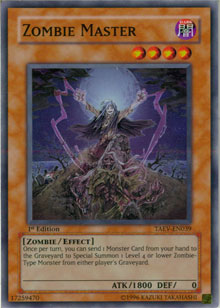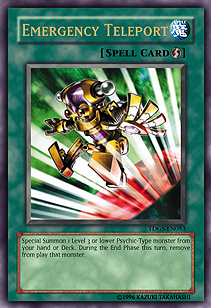 The first time I ever played Zombies was the first round of Shonen Jump Championship Washington, where the deck broke through as a successful rogue build. The deck was so good I was able to pull out a 10-0 performance, stopped only by Paul Levitin on Day 2, who was also playing Zombies. I credit my Day 1 success to some beginner’s luck, because my lack of experience definitely cost me the very first duel of the day.
The first time I ever played Zombies was the first round of Shonen Jump Championship Washington, where the deck broke through as a successful rogue build. The deck was so good I was able to pull out a 10-0 performance, stopped only by Paul Levitin on Day 2, who was also playing Zombies. I credit my Day 1 success to some beginner’s luck, because my lack of experience definitely cost me the very first duel of the day.
The game had come almost to a halt. The deck's inability to destroy monsters caught up with me and I was staring at a huge amount of cards and no way to blast through my opponent's monsters. Being the first game of the day I wasn't yet warmed up, and didn't realize until it was too late that I could have won turns ago. I was holding Creature Swap and could special summon a field of Zombie Masters, Ryu Kokki and Spirit Reaper.
I could have maxed out my field, traded my opponent a face-up attack mode Reaper for anything and beaten up the Reaper for game. My opponent had built up enough of a spell or trap zone that by the time I realized my mistake I couldn't win anymore, and I lost the game a few turns later. Luckily for me I was able to pull out the final two games and go on to make Day 2.
This is what I would consider to be a rookie mistake. It's excusable for someone who's trying out competitive play for the first time, but a seasoned veteran should be able to see the play. It's important that winning the game always be on the top of your priority list, and you should be looking for every possible way to win. Clearly I wasn't looking to win at that point. My consideration was on how to turn my handful of cards into monster destruction. I had gone off with Card of Safe Return, and instead of having winning in the back of my mind I was more worried about decking out and losing.
The reason I wasn't looking to win was because I didn't have a mental catalogue of all the ways my deck could do it. It hadn't occurred to me yet that I could win while my opponent controlled five monsters of his own because it was my first game with the deck. I am lucky that mistake didn't cost me a chance at winning the tournament. Not knowing all the things my deck could cost me a game, and if my opponent had been able to win a second duel I would have nothing and no one to blame but myself.
This is why you need to practice. You need to know how games can be won because in a nine round tournament you will need to exhaust your entire arsenal. Games are won by skill, by luck, by trickery, and by the most perfect of timing. Sure, you'll win a good percentage of your games with the regular game plan, but almost always one of your wins will be something you couldn't have planned.
So the goal should be obvious: become capable of planning the improbable victories. Obviously random events will still happen, but if you're able to recognize the symptoms of rare occurrences you'll be ready to take advantage of them when they come, although they're called "improbable" for a reason. Even the most practiced veteran is going to encounter something he or she is unfamiliar with every once and a while, but, the more you play, the more scenarios you can cross off your mental checklist.
 I'm sure you've heard this stuff before. It's something parents and coaches pound into your head every time you want to bail out on a practice, but it works, and you don't have to look any further than the Shonen Jump circuit for proof. The top players all play, a lot, and it pays off for them at every tournament. At the beginning of the format the player with the best new decklist is likely going to win the tournament. Just look at Shonen Jump Baltimore at the start of this format. Of the eight TeleDAD players who made Day 2, five of them were using the Team Overdose decklist.
I'm sure you've heard this stuff before. It's something parents and coaches pound into your head every time you want to bail out on a practice, but it works, and you don't have to look any further than the Shonen Jump circuit for proof. The top players all play, a lot, and it pays off for them at every tournament. At the beginning of the format the player with the best new decklist is likely going to win the tournament. Just look at Shonen Jump Baltimore at the start of this format. Of the eight TeleDAD players who made Day 2, five of them were using the Team Overdose decklist.
That deck itself is proof that practice is all you need to be the best. Coming into the tournament the members of Overdose hadn't talked at all about what our decks would look like. Instead we compared the differences between our builds and shared our experiences from playtesting. "We put in the third Reinforcement of the Army because drawing two in the opener is awesome." That's something we found out during playtesting. We were also able to contribute the removal of Armageddon Knight and Solemn Judgment as well as the addition of Giant Trunade to the deck.
The removal of Solemn Judgment was the reason we did so well that tournament. Synchros with Solemns could beat Gladiator Beasts easily, but in the TeleDAD mirror match Solemn Judgment hurt more than it helped. The opponent always had another Synchro anyway and because of your Solemn you were in range of being destroyed. We realized how often this happened in practice, so Lazaro built a deck that took advantage of this common scenario. Solemns came out and faster spells went in. Now when we encountered the scenario, "your opponent has Solemn Judgment face down," we knew how to react. Get the opponent to Solemn something and surprise that player with a flurry of cards and win on that turn.
It's a strategy that put almost the entire team into Day 2, yet it didn't win any of us the tournament. In fact, most of the OD players went out in the first round of Day 2 play. Bad luck can only explain so much, so what happened to bring down what was such a promising tournament? We simply didn't practice the new decklist enough. After learning that this list could beat both Gladiators and the current TeleDAD build we only tested for minor imperfections. After we were satisfied with the build the testing was over.
What we didn't do was test to see how we could be beaten, and instead we found out how we could be beaten on Day 2 when it happened. Prolonging the game, critical D.D. Crows, and OTKing without fear turned out to be winning strategies against our build. By the time the next tournament rolled around we had a newer, better decklist. This one used Solemn Judgments effectively because we knew how to not lose with them now. That we also learned in practice.
-Matt Peddle